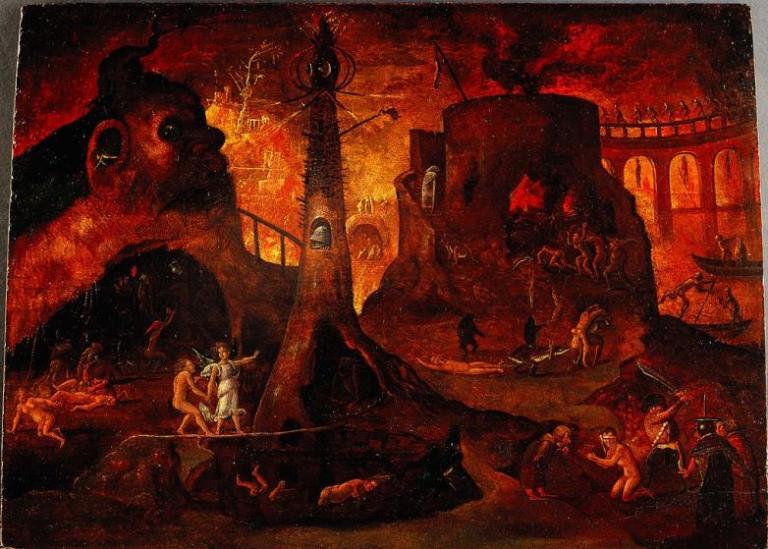The threat of eternal punishment–going to Hell–used to be a staple of Christian teaching. But we don’t hear much about Hell anymore, even in conservative churches. A new book says that without Hell, the Bible’s teachings about both sin and redemption lose their meaning.
The assumption today seems to be that contemporary people cannot conceive of any kind of eternal punishment, to the point that they will never take it seriously, unless, perhaps they become Christians first and then can be taught the more unpleasant parts later.
But this squeamishness was unknown in the past. Even Deists, who believed in religion according to reason alone, believed in a realm of eternal punishment. Otherwise, they reasoned, injustices on earth would go unpunished, and this would not be the best of all possible worlds. Deists rejected Christianity–with its unreasonable doctrines of God’s grace, incarnation, and redemption–but they believed in Hell.
So maybe our discomfort with Hell is our blindspot today. And if Hell exists, it doesn’t matter whether we are uncomfortable with the idea or not.
Kip Phelps is the author of God Loves You, Now Go to Hell: Why Good People End Up in a Very Bad Place. He says that we need to recover the doctrine of eternal punishment and, though the book seems to have some big problems, he makes some interesting arguments about Hell that I hadn’t thought of before.
My fellow Patheos blogger Frank Viola interviews him at The Deeper Journey. A sample:
Instead of asking, “what is your book about,” I’m going to ask the question that’s behind that question. And that unspoken question is, “how are readers going to benefit from reading your book?”
Hell isn’t on our radar, but it should be. In previous centuries, the idea of a place of eternal torment aroused fear, but it doesn’t anymore. The concept of hell is unreasonable to the modern mind, and words like sin, condemnation, repentance, and redemption are losing their impact. Evidence tells us, however, that hell is very real, its torments are ferocious, and its population is huge.
It’s enormously ironic that many people think hell isn’t real when, as the book explains, it’s actually reality on steroids.
The author says that God talked to him audibly–twice–so I am skeptical. I suspect this comes from a Pentecostal perspective, with at least some reliance on reports of “near death experiences” of going to Hell and coming back to tell about it. So I am not endorsing this book at all.
It seems, though, to have a couple of interesting arguments that I hadn’t really thought of before.
People cite the “problem of suffering” to disprove the existence of God, but Phelps turns that argument on its head: Clearly there is suffering. God does exist. So suffering must not be completely evil. The “problem of suffering” at best shoots down a particular view of God–the one that sees Him as so beneficent that He doesn’t want anyone to suffer–but it doesn’t shoot down the more traditional views of God as a terrifying judge.
I’m also intrigued by Phelp’s statement–which is a chapter in his book–that Hell is “reality on steroids.” Nonbelievers today often say that life is meaningless, full of darkness, full of suffering, a realm of cruelty, where the strong prey on the weak, etc., etc. If there is a life beyond death for nonbelievers, why should it be any different? Or, rather, if there is a life beyond death that is purged of goodness (since all good things come from God), why shouldn’t it be similar to what nonbelievers think life on earth to be–only much more so?
I’m not sure that Phelps develops these points as I just have. But the interview and what I gleaned from Amazon’s “look inside” feature sent me towards these thoughts. For more of my thoughts on the subject, see this.
So what do you think? Does contemporary Christianity need to recover the doctrine of eternal punishment? Should pastors be preaching about this?
Or is the teaching so unbelievable to people today that hearing about it would just drive them away?
Are there better ways to teach it?
Illustration: Oil painting by a follower of Hieronymous Bosch [CC BY 4.0 (http://creativecommons.org/licenses/by/4.0)], via Wikimedia Commons














